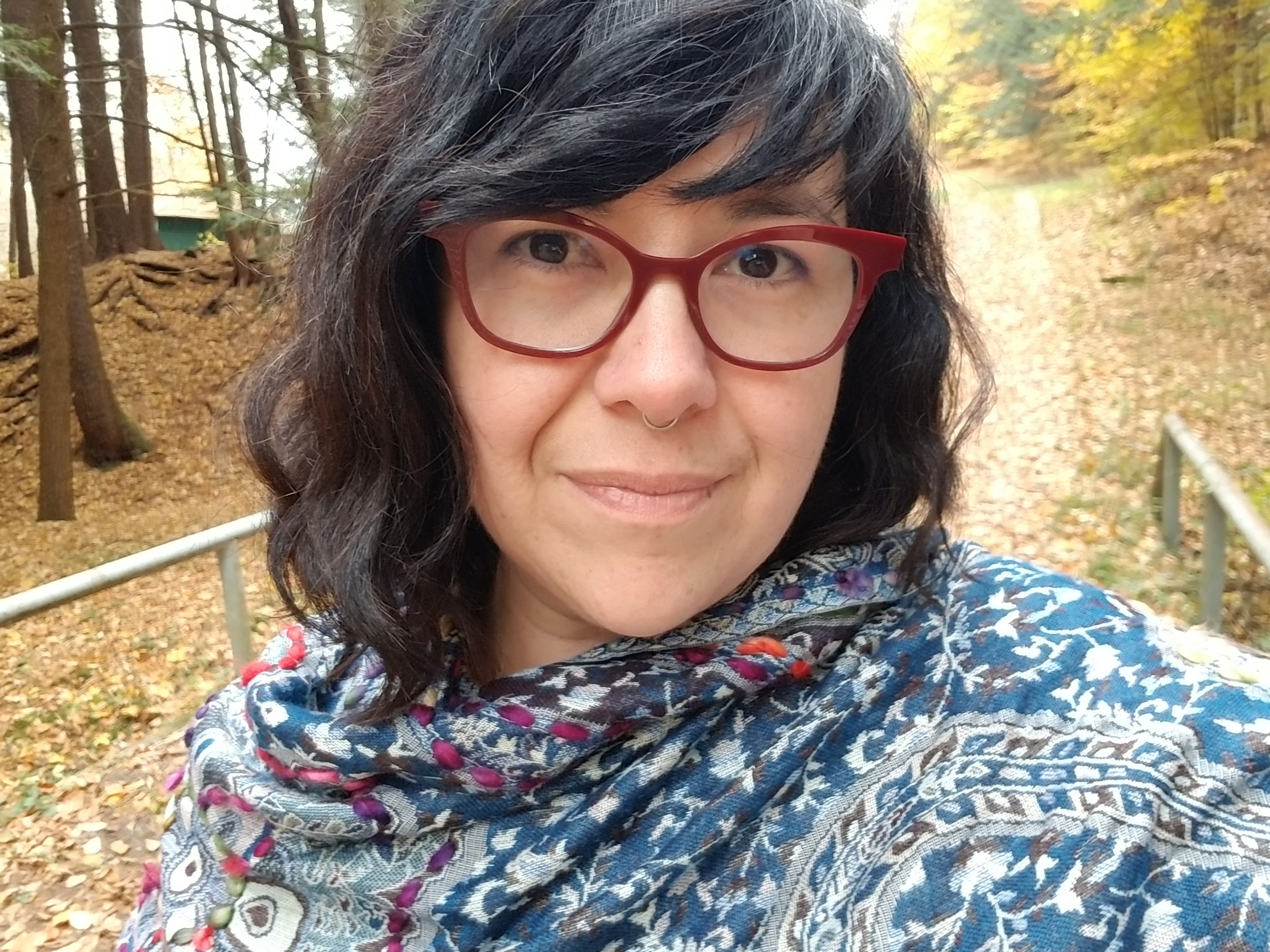Center for Native Peoples and the Environment
Current Sloan Indigenous Graduate Fellows
Current Sloan Indigenous Graduate Fellows
Aaron Hagman
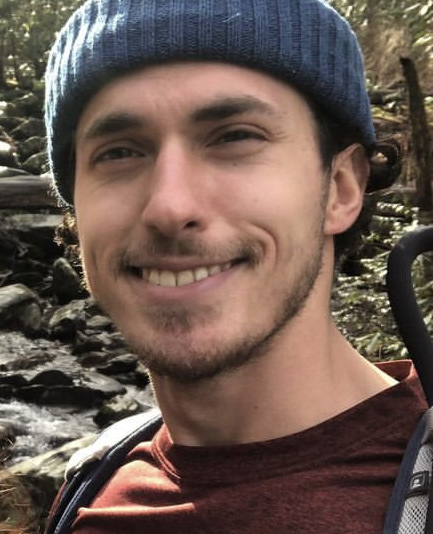
Aaron Hagman is a member of the Lumbee Tribe of North Carolina, the people of the black water. He also is from Michigan and is shaped equally by the waters of the Great Lakes and the swamps of coastal North Carolina. Aaron is currently pursuing a Master's of Science in Environmental and Forest Biology under the guidance of Dr. Gregory McGee.
In 2019 Aaron received his BS from Michigan State University in Environmental Studies and Community Sustainability with a minor in environmental economics. While at MSU he also served as a research assistant for the University's Cropping Systems Agronomy Lab. Following his undergrad Aaron went on to work for both the National Park Service as a forest health technician monitoring the impacts of high mortality events on northern hardwood forests, and the US Forest Service as a silviculture technician.
Aaron now is continuing his education to explore adaptive management of forest lands in the face of global climate change, and how climate change may contribute to cultural loss in south-eastern coastal tribes. Outside of his schooling Aaron has a passion for folk art, traditional green wood working, and bluegrass music. Aaron's goal after graduate school is to return to working for federal land management agencies where he can promote tribal co-management of public lands.
Alex Walls
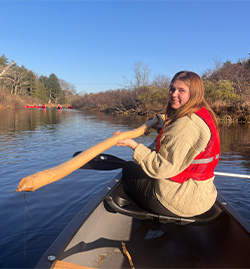
Aloha kākou my name is Alex Walls and I am a Sloan Indigenous Graduate Partnership student in Environmental Science. I graduated from SUNY ESF with a B.S. in Environmental Education and Interpretation focusing on outdoor education. I love working with youth and have been a substitute teacher for the SCSD and volunteered with local libraries and youth organizations developing and hosting environmental education programs in Syracuse. I love being in the water and sharing my love for moss, fungi, and the world around us.
I am working under Dr. Andrea Parker and Dr. Shari Dann and my research is focused on assessment of the Timbuctoo Climate Science and Careers Summer Institute, a new program funded by New York State. I am working to develop assessment tools which will inform its effectiveness at reaching its goals of increasing awareness, opportunity and access to Environmental careers for high school participants.
Amber Ballenger
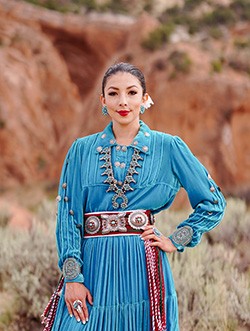 Amber (she/her) is Diné from the Navajo Nation and is part of the Meadow People Clan
and Folded Arms People Clan. She was born and raised in New Mexico, where she cultivated
a deep relationship with nature growing up on her family’s ranch on the Navajo Reservation.
She earned her Bachelor's degree in Family & Child Studies with a minor in Psychology
from the University of New Mexico in 2017. Since then, she has focused her career
on outdoor education. She is currently pursuing a Master's of Science degree in Environmental
Science at SUNY-ESF and is honored to be a part of the Center for Native Peoples and
the Environment. Her research interests explore how biophilic design in educational
spaces influences child development, merging her background in education with a passion
for creating nurturing and ecology-focused learning environments for children, especially
Indigenous children. She has worked with the National Indian Youth Leadership Project,
supporting Indigenous youth in building healthy lifestyles and relationships with
nature. As an ambassador for her community and tribe, she held the title of Miss Gallup
Intertribal Indian Ceremonial Queen. Other work experience includes teaching at a
nature-based preschool in San Francisco and working as an Instructor and Talent Acquisition
Supervisor for Avid4 Adventure in California and Colorado, guiding children through
hiking, kayaking, rock climbing, and mountain biking. Ultimately, through her work
and research, she aims to foster deeper connections between children and the natural
world, shaping future generations to be stewards of the environment."
Amber (she/her) is Diné from the Navajo Nation and is part of the Meadow People Clan
and Folded Arms People Clan. She was born and raised in New Mexico, where she cultivated
a deep relationship with nature growing up on her family’s ranch on the Navajo Reservation.
She earned her Bachelor's degree in Family & Child Studies with a minor in Psychology
from the University of New Mexico in 2017. Since then, she has focused her career
on outdoor education. She is currently pursuing a Master's of Science degree in Environmental
Science at SUNY-ESF and is honored to be a part of the Center for Native Peoples and
the Environment. Her research interests explore how biophilic design in educational
spaces influences child development, merging her background in education with a passion
for creating nurturing and ecology-focused learning environments for children, especially
Indigenous children. She has worked with the National Indian Youth Leadership Project,
supporting Indigenous youth in building healthy lifestyles and relationships with
nature. As an ambassador for her community and tribe, she held the title of Miss Gallup
Intertribal Indian Ceremonial Queen. Other work experience includes teaching at a
nature-based preschool in San Francisco and working as an Instructor and Talent Acquisition
Supervisor for Avid4 Adventure in California and Colorado, guiding children through
hiking, kayaking, rock climbing, and mountain biking. Ultimately, through her work
and research, she aims to foster deeper connections between children and the natural
world, shaping future generations to be stewards of the environment."
Atah Cocker
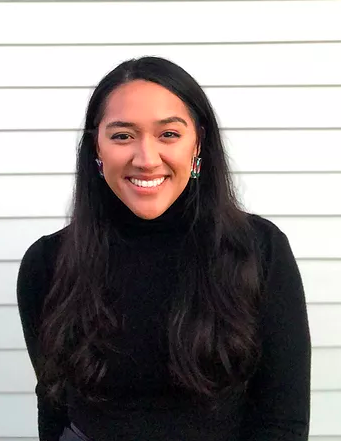
M.S. in Environmental Science, Water & Wetland Resource Studies
Autumn Espāhkihihūhkiw Raasch
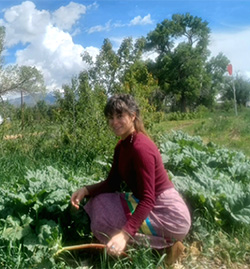 Posoh, my name is Autumn Espāhkihihūhkiw Raasch and I am an incoming graduate student
for Fall 2023 at SUNY ESF. I am a Menominee, Stockbridge-Munsee, and Oneida farmer,
originally from Wisconsin. Here, I will be studying Indigenous Food Sovereignty and
learning more about traditional ways of growing food.
Posoh, my name is Autumn Espāhkihihūhkiw Raasch and I am an incoming graduate student
for Fall 2023 at SUNY ESF. I am a Menominee, Stockbridge-Munsee, and Oneida farmer,
originally from Wisconsin. Here, I will be studying Indigenous Food Sovereignty and
learning more about traditional ways of growing food.
Cassandra Minerd
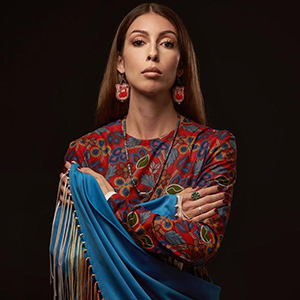
Sgé.noń. My name is Cassandra Minerd but I go by Bean. I am Onondaga Eel clan. I grew up and live on the Onondaga Nation. I come from a strong matriarch society as well as a strong matriarch family. My family holds strong titles within our confederacy. All of my teachings come from my late grandmother, Eel clan mother, Phoebe Hill, and my uncle is Tadodaho, Sidney Hill. I attended SUNY Brockport for my undergrad where I studied Recreation and Leisure studies. I graduated from Brockport in 2017. During my school winter and summer breaks I was involved with the Onondaga Nation Youth Group as a Youth Leader. My interest in being involved with environmental work increased during my time being a youth leader. My mentor, Hazel Powless, had our youth group be involved in many environmental programs and workshops where we created connections with students and staff from ESF as well as other environmental businesses. I was able to go to Native Earth Summer Program located in the Adirondacks where my statement I made at the end of the camp gave me an opportunity to go to NYC for the Climate Summit in 2019 where I was invited to be one of the members of the delegation to speak about Indigenous solutions to the Climate Crisis that was convened by the Nature Conservancy at the UN. Since then, I have been a part of many climate workshops that are held on the Nation. I made the big move of continuing my education at ESF where I am pursuing a Masters of Environmental Sciences. My goal is to study plants then use traditional knowledge and teachings to use native plants for healing and medicinal purposes. My other goal is also to learn ways to combat climate change to protect Mother Earth.
Corey Blodgett-Edgar
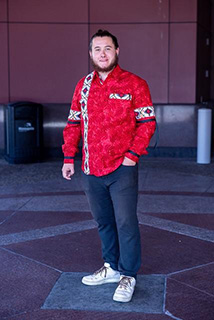 Shíx páchway, good day! My name is Corey Blodgett-Edgar and I come from the Confederated
Tribes and Bands of the Yakama Nation. I spent most of my life in Central Washington
State on the Yakama Indian Reservation with a background in tribal forestry and wildland
fire. I graduated from Northwest Indian College in Lummi, Washington with a B.S. in
Native Environmental Science in 2025, where I studied ethnobotanical relationships
of Pacific Northwest tribes and our local plants, and I was particularly interested
in wild huckleberries in the Cascades. I’m currently a master’s student in Environmental
Science at SUNY ESF studying the relationships between plants and mycorrhizal fungi,
specifically in the family Ericaceae (the same family as huckleberries!). I learned
about the Center for Native Peoples and the Environment through my advising committee
at NWIC and immediately applied to the Sloan Indigenous Graduates Partnership and
began my first semester in August 2025. I’m co-advised by Dr. Madeline Nyblade from
SUNY ESF and Dr. Louis (Jamie) Lamit from Syracuse University. I’m excited to continue
my academic journey with such a supportive group here at SUNY ESF!
Shíx páchway, good day! My name is Corey Blodgett-Edgar and I come from the Confederated
Tribes and Bands of the Yakama Nation. I spent most of my life in Central Washington
State on the Yakama Indian Reservation with a background in tribal forestry and wildland
fire. I graduated from Northwest Indian College in Lummi, Washington with a B.S. in
Native Environmental Science in 2025, where I studied ethnobotanical relationships
of Pacific Northwest tribes and our local plants, and I was particularly interested
in wild huckleberries in the Cascades. I’m currently a master’s student in Environmental
Science at SUNY ESF studying the relationships between plants and mycorrhizal fungi,
specifically in the family Ericaceae (the same family as huckleberries!). I learned
about the Center for Native Peoples and the Environment through my advising committee
at NWIC and immediately applied to the Sloan Indigenous Graduates Partnership and
began my first semester in August 2025. I’m co-advised by Dr. Madeline Nyblade from
SUNY ESF and Dr. Louis (Jamie) Lamit from Syracuse University. I’m excited to continue
my academic journey with such a supportive group here at SUNY ESF!
Dineh Judd
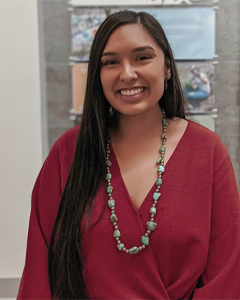
Navajo Nation
Northwest Indian College
M.S. in Environmental Science, Coupled Natural and Human Systems
Erica A. Wood
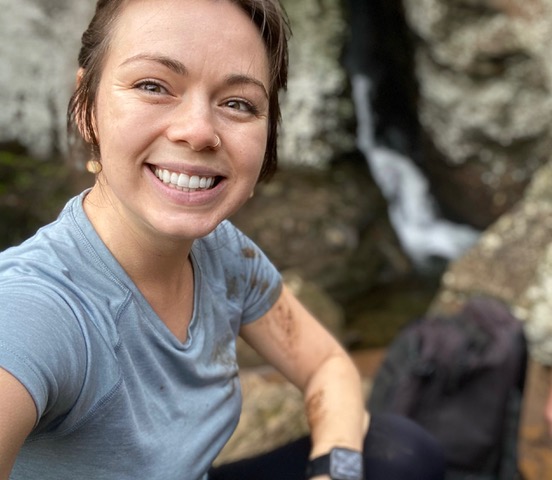
Erica Wood, Atmaguq, is Alaska Native Iñupiaq from the people of Fish River and the Native Village of White Mountain, Alaska. She is also Appalachian, of the mountains, and grew up in the deep South. She is a storyteller, artist, athlete and adventurer, and derives great strength from her ancestors and the rich traditions of her dual cultures. At SUNY ESF, Erica is pursuing a Master's of Science in Conservation Biology, focusing on ethnobotany. She holds a BA in International Studies with a focus on global development and food systems from Virginia Tech.
Erica has worked with food justice organizations up and down the East Coast. She taught gardening, managed a SNAP-focused farmers market, and advocated for equitable food policy at a nonprofit in North Central, Massachusetts. That experience led her to Boston, where she continued to work in the nonprofit sector on issues dealing with environmental justice and conservation. Part of her job included managing a multi-year river herring monitoring program and invasive plant management projects. In 2021 she completed a year-long fellowship with the Environmental Leadership Program (ELP), a national network that trains environmental and social change leaders. Most recently, Erica worked as an Assistant Farmer at Barrett's Mill Farm, a women-owned and operated organic vegetable farm in Concord, Massachusetts.
Erica attributes her respect and curiosity for the natural world to her childhood lived largely outdoors—and to her parents and beloved grandparents who each, in their own ways, shared their wisdom of the land. She enjoys celebrating her relationship with the land and non-human beings: foraging, fishing, farming, practicing traditional Inupiaq and Appalachian food preparation, kayaking, and walking in the woods. Erica relocated from Boston with her wonderful fiancé and cat, and is eager to build a community in Syracuse.
Justin T. Herne
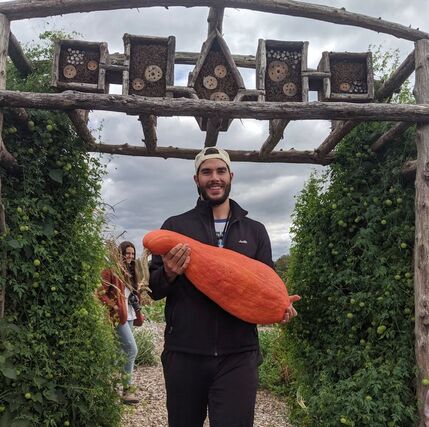
She:kon sewakwe:kon! My name is Justin T. Herne and I am a Sloan Indigenous Graduate Partnership student in the Environmental Biology Department. I am pursuing a master's degree in Aquatics & Fisheries Science. I work for SUNY ESF's Center for Native Peoples and the Environment as a graduate teaching assistant, where I currently provide assistance for Dr. Robin Wall Kimmerer's course Indigenous Issues and the Environment. Under the advice of Dr. Karin Limburg and Neil Patterson Jr., I am crafting my thesis around fisheries management and indigenous communities. As a member of the Mohawk Nation/ Mohawk Council of Akwesasne, I have longed to use my educational experiences and passion for fisheries to support indigenous communities and tribal sovereignty. I am a 2015 SUNY ESF alumni, where I majored in Aquatic & Fisheries Science and minored in Marine Science as an undergraduate.
Prior to graduate school, I served as a Fish and Wildlife Technician for the Hudson River Fisheries Unit out of NYSDEC's Region 3 for the past 3 years. My unit was responsible for surveying and managing the diadromous fish in the tidal Hudson River. This gave me great experience with fisheries management, the dark side of resource management, and optimal fisheries research experience. Additionally, I worked as a Field & Program Assistant for the non-profit seed organization Seedshed. While working for Seedshed, I was able to dive into the world of cross cultural partnerships and engage with different communities through seed saving, community garden support and seed rematriation. O:nen kí
Jade Haumann
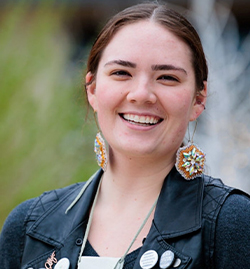
My name is Jade Haumann, of the Seneca Nation Wolf clan raised here in Onondaga. I’ve spent my entire life curious about the living world around me, carefully learning from all the plant and animal relatives we live among. Now I will spend my time at ESF studying traditional practices of controlled burns in our Haudenosaunee communities specifically in wetland habitats in observance of responses from cattails, phragmites, and other plants of concern.
Mary Banner
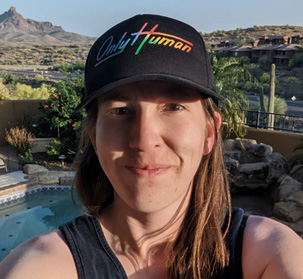 Mary Banner graduated with a bachelor's from Northwest Indian College pursing a degree
in Native Environmental Science and GIS in Washington State. She is a first-generation
college graduate and is continuing her education for a masters at SUNY ESF studying
Ecosystems: Land, Air, Water.
Mary Banner graduated with a bachelor's from Northwest Indian College pursing a degree
in Native Environmental Science and GIS in Washington State. She is a first-generation
college graduate and is continuing her education for a masters at SUNY ESF studying
Ecosystems: Land, Air, Water.
She is from Fox Island, WA. She is Ponca and Mille Lacs Band of Ojibwe.
While at Northwest Indian College she worked on a project with the Salish Sea Research Center/NASA Ames focused on the Enbridge Line 3 pipelines and wild rice in Minnesota where she used GIS and EO data applications to map the pipeline crossing and water quality impacts on food sources. She also has previous experience with NASA ABoVE, the Yakama Nation Fisheries, and the EPA.
This summer, Mary has worked diligently to cultivate a database of our Indigenous community and her work will help identify Indigenous champions in the EO space and assist with future regional planning efforts for the Indigenous Peoples Initiative/NASA.
Mary will be celebrating her 6th year of sobriety at the end of the summer of '23. Miigwech.
Mia Glover
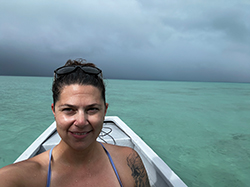
Greetings, my name is Mia. I am a PhD student at SUNY ESF, focusing on fisheries science within the Coupled Human and Organismal Systems Lab in the Department of Environmental Biology. My research looks at tropical fisheries across the South Pacific, where I explore innovative methods to help protect marine ecosystems and the communities that rely on them. By integrating drone technology, human dimensions, and marine species conservation, I aim to develop collaborative, sustainable solutions to environmental challenges.
Guided by my cultural heritage, I bring a deep commitment to Indigenous rights, food sovereignty, and ecosystem health to my work. My passion for vulnerable marine species and connection to my community drive my advocacy for a future where Traditional Knowledge and scientific innovation work together to preserve natural resources.
Nevaeh Marshall
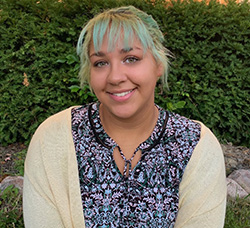 Aanii Bozhoo! My name is Nevaeh Marshall. I am an enrolled member of the Sault Ste.
Marie Band of Chippewa Indians and a descendant of the Rosebud Lakota. I am bear clan.
I graduated from Michigan State University with a B.S. in Horticulture Science in
2023. At SUNY ESF, I am working on a M.S. in the Graduate Program of Environmental
Science. My advisors are Dr. Maddy Nyblade and Dr. Jean Kayira. My focus is on culturally
important plants to Indigenous Peoples. My goal is to find an intersection between
plant knowledge and traditional ecological knowledge. In my spare time, I am a jingle
dress dancer and spend my spare time beading, sewing, hiking, and reading.
Aanii Bozhoo! My name is Nevaeh Marshall. I am an enrolled member of the Sault Ste.
Marie Band of Chippewa Indians and a descendant of the Rosebud Lakota. I am bear clan.
I graduated from Michigan State University with a B.S. in Horticulture Science in
2023. At SUNY ESF, I am working on a M.S. in the Graduate Program of Environmental
Science. My advisors are Dr. Maddy Nyblade and Dr. Jean Kayira. My focus is on culturally
important plants to Indigenous Peoples. My goal is to find an intersection between
plant knowledge and traditional ecological knowledge. In my spare time, I am a jingle
dress dancer and spend my spare time beading, sewing, hiking, and reading.
Ryan Masayesva
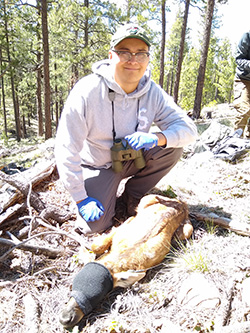
I am an incoming graduate student, seeking an MPS in Environmental and Forest Biology.
I did my undergraduate at Arizona State University with a major in Conservation Biology
and Ecology. My heritage includes the Rosebud Sioux and Hopi tribes, and I have spent
time in both South Dakota and Arizona. The past few years I have primarily worked
in the west, and have primarily focused my work on carnivore ecology in response to
anthropological changes on the landscape. Hobbies of mine include hunting, fishing,
and hiking, and I particularly enjoy upland bird hunting.
Stephanie Morningstar
Stephanie Morningstar is Mohawk, Turtle clan with roots in Six Nations of the Grand River and Tyendinaga territories. A PhD student at SUNY ESF's Center for Native Peoples and the Environment, she is focusing her research on Biocultural Re-story-ation of culturally relevant lands. She is an herbalist, soil and seed steward, scholar, student, and Earth Worker dedicated to decolonizing and liberating minds, hearts, and land- one plant, person, ecosystem, and non-human being at a time. Stephanie is the Executive Director and Resources, Relationships, and Reciprocity Co-Director of the Northeast Farmers of Color Land Trust, an organization dedicated to advancing land access for Indigenous, Black, Latinx, Asian, and other land stewards of color. She grows medicines and food with and for her community at Sky World Apothecary & Farm; and teaches about the wonders of plant medicine at Seed, Soil, + Spirit School.
Sloan Indigenous Graduate Alumni
Spencer Lone Fight

I am a citizen of the Mandan, Hidatsa, Arikara Nation, otherwise known as the Three Affiliated Tribes, on my mother's side and Muscogee Creek on my father's side. My mother is Lisa Lone Fight, and my father is William Harjo-Lone Fight. I have lived on the Sisseton-Wahpeton Reservation, the Wind River Reservation, Chickasaw Nation in Oklahoma, briefly on the Pima reservation, and the Tuscarora Indian Nation. I was a singer for the Wind River Reservation-based "Scout River" drum group, and I dance northern traditional style.
I am also a graduate of Dartmouth College, where I studied International Relations through the Government department and contemporary Indian Country through the Native American Studies program. During my time there I applied the precepts of international relations to the historical and contemporary situations of indigenous people in the United States. Creating detailed analyses were part and parcel of both programs, with my writing ranging from application of Foucaultian philosophy to everyday indigenous lives to military analysis of United States basing options in the Pacific.
I am continuing my education at SUNY ESF where I am pursuing a Masters of Professional Studies in Applied Ecology. Currently, my focus is on the management of invasive species, with special focus on the impact of invasive species on the cultural resources of Native Nations. My goal is to return to the regulatory agencies where I have previously worked and implement TEK-informed policies and work towards the prevention of further invasions and elevating land justice wherever possible.
Susannah Howard
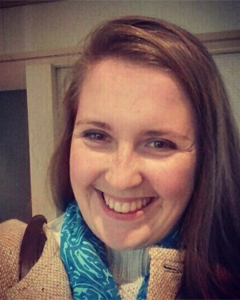 Bozho nikanek, Getsimnajeknwet ndeznekas. Bodewadmi kwe endow. Vermont ne dotchbya.
Hello friends, my name is Susannah Howard, and I am a member of the Citizen Potawatomi
Nation. I am from Thetford, Vermont located on the western bank of the Connecticut
River. In May 2019, I graduated from Smith College (Northampton, Massachusetts) with
a BA in Environmental Geosciences and certificate in Native American and Indigenous
Studies. During my time at Smith, I had many incredible opportunities to focus on
traditional ecological knowledge of Indigenous communities and its mobilization to
address environmental problems, especially related to climate change adaptation, including
the Citizen Potawatomi Leadership Program, Summer Undergraduate Research Fellowship
(Geosciences, Smith College), Smith College's Internship at the Smithsonian Institution
(National Air and Space Museum), REU on Sustainable Land and Water Resources (University
of Minnesota), and Kahn Liberal Arts Fellowship on Food (Smith College). At SUNY ESF,
I am pursuing a MS in Environmental Science, in Coupled Natural and Human Systems.
I will be studying how the culturally important plants of the Potawatomi, like Manoomin
(wild rice) and sugar maple are and will be impacted by climate change, and how these
impacts might be mitigated through intertribal collaborations among the Potawatomi
Nations in the future.
Bozho nikanek, Getsimnajeknwet ndeznekas. Bodewadmi kwe endow. Vermont ne dotchbya.
Hello friends, my name is Susannah Howard, and I am a member of the Citizen Potawatomi
Nation. I am from Thetford, Vermont located on the western bank of the Connecticut
River. In May 2019, I graduated from Smith College (Northampton, Massachusetts) with
a BA in Environmental Geosciences and certificate in Native American and Indigenous
Studies. During my time at Smith, I had many incredible opportunities to focus on
traditional ecological knowledge of Indigenous communities and its mobilization to
address environmental problems, especially related to climate change adaptation, including
the Citizen Potawatomi Leadership Program, Summer Undergraduate Research Fellowship
(Geosciences, Smith College), Smith College's Internship at the Smithsonian Institution
(National Air and Space Museum), REU on Sustainable Land and Water Resources (University
of Minnesota), and Kahn Liberal Arts Fellowship on Food (Smith College). At SUNY ESF,
I am pursuing a MS in Environmental Science, in Coupled Natural and Human Systems.
I will be studying how the culturally important plants of the Potawatomi, like Manoomin
(wild rice) and sugar maple are and will be impacted by climate change, and how these
impacts might be mitigated through intertribal collaborations among the Potawatomi
Nations in the future.
Bradley Thomas
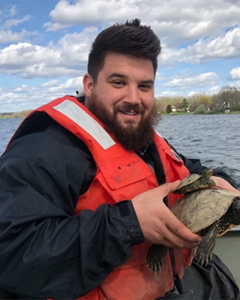
My name is Bradley Thomas, I am a Snipe clan member of the Tuscarora Nation. I graduated from Canisius College of Buffalo NY in the Spring of 2016 with a B.A. in Communications Studies with a concentration in Public Relations. While in school I interned for the Clean Air Coalition of Western New York and the Tuscarora Environment Program of the Haudenosaunee Environmental Task Force. After school I worked as an Environmental Technician for the Tuscarora Environmental Program. Next, I took a position with the United States Fish and Wildlife Service as an Outreach Coordinator for the year of 2019 before coming to SUNY ESF to pursue my Masters in Forestry in the Sustainable Resource Management Department. My focus is on the application of treaty rights on public lands and incorporating cultural needs into resource management plans.
Jade Morning Sky Little
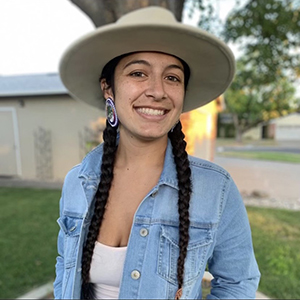
Oglala Lakota, Gabrielino (Tongva), Chicana
Anpetu waste (Good day). My name is Jade Morning Sky Little. I am Oglala Lakota from the Pine Ridge Indian Reservation in South Dakota, Gabrielino (Tongva) from California, and Chicana. I was raised in Palm Springs, CA near the Agua Caliente Indian Reservation. I received my Bachelor's of Science degree in Wildlife, Fish and Conservation Biology with a concentration in Wildlife Health at University of California Davis in 2019. Currently, I am pursuing a Master's of Science degree in Conservation Biology at SUNY ESF. Currently, I am a Sloan Indigenous Graduate Scholar and this program has provided me immense financial and cultural support in my academic pursuits at ESF.
First and foremost, I would like to acknowledge my place within my graduate research. My research will focus on the area of Fellows Falls, which resides on Onondaga ancestral lands. As an Oglala Lakota and Tongva woman, and as an Indigenous graduate student at SUNY ESF, it is very important for me to acknowledge the early and continuing caretakers of this land. Within this project, I will advocate my inclusion by sharing my identity to help convey the importance of Place-based Knowledge and to recognize those who came before me and the knowledge I will learn from this academic opportunity.
My research will document the historical ecology of the plant community at a local landscape and waterscape (i.e. Fellows Falls in Tully, NY) and I will analyze the current plant biota in order to construct a biocultural restoration plan that addresses the ecological and cultural goals. The purpose of this project is to not only address the biocultural management of Fellows Falls, but also the cultural ties to Fellows Falls, specifically, the Onondaga Nation. Fellows Falls is one of many areas of Onondaga ancestral lands that have been impacted by salt mining and there is significant displacement from this place. My thesis will not only help strengthen Indigenous methodologies and cultural knowledge within academic literature, but also help advocate for Onondaga connections to land and how these connections are fundamental and indispensable to the final decision of property ownership and the environmental management of Fellows Falls.
Wopila.
Kawainohiaakalani Navares
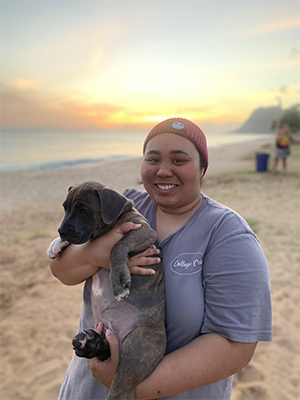 Aloha mai my name is Kawainohiaakalani Navares. I was born and raised on the Island
of Oahu. I completed my undergrad at Humboldt State University graduating with a Bachelors
of Science in Forestry and Soil Science, and a double minor in Geospatial Analysis
and Indigenous Peoples, Natural Resource Use and the Environment. I started my graduate
work at SUNY ESF in Forest Pathology and Mycology working under Thomas Horton. I have
done a lot of work in restoration in the Hawaiian Islands, I worked with Kupu in the
Koolau Mountains, removing invasive Manuka along the hillside, outreach teaching youth
how to conduct Opae Ula population samples, restoring cultural sites, and educating
people on the different cultural practices. I worked as a University of Hawaii, Hilo
intern in the Spatial Data Analysis Lab monitoring the effect of topography on lava
movement in the kilauea volcano. I was using the TEK of the area and combining it
with the scientific data from the remote sensing monitoring, to create a volcanic
eruption response and education system to help residents living near shield volcanoes,
about evacuation and emergency preparedness.
Aloha mai my name is Kawainohiaakalani Navares. I was born and raised on the Island
of Oahu. I completed my undergrad at Humboldt State University graduating with a Bachelors
of Science in Forestry and Soil Science, and a double minor in Geospatial Analysis
and Indigenous Peoples, Natural Resource Use and the Environment. I started my graduate
work at SUNY ESF in Forest Pathology and Mycology working under Thomas Horton. I have
done a lot of work in restoration in the Hawaiian Islands, I worked with Kupu in the
Koolau Mountains, removing invasive Manuka along the hillside, outreach teaching youth
how to conduct Opae Ula population samples, restoring cultural sites, and educating
people on the different cultural practices. I worked as a University of Hawaii, Hilo
intern in the Spatial Data Analysis Lab monitoring the effect of topography on lava
movement in the kilauea volcano. I was using the TEK of the area and combining it
with the scientific data from the remote sensing monitoring, to create a volcanic
eruption response and education system to help residents living near shield volcanoes,
about evacuation and emergency preparedness.
Biidaaban Moses Reinhardt
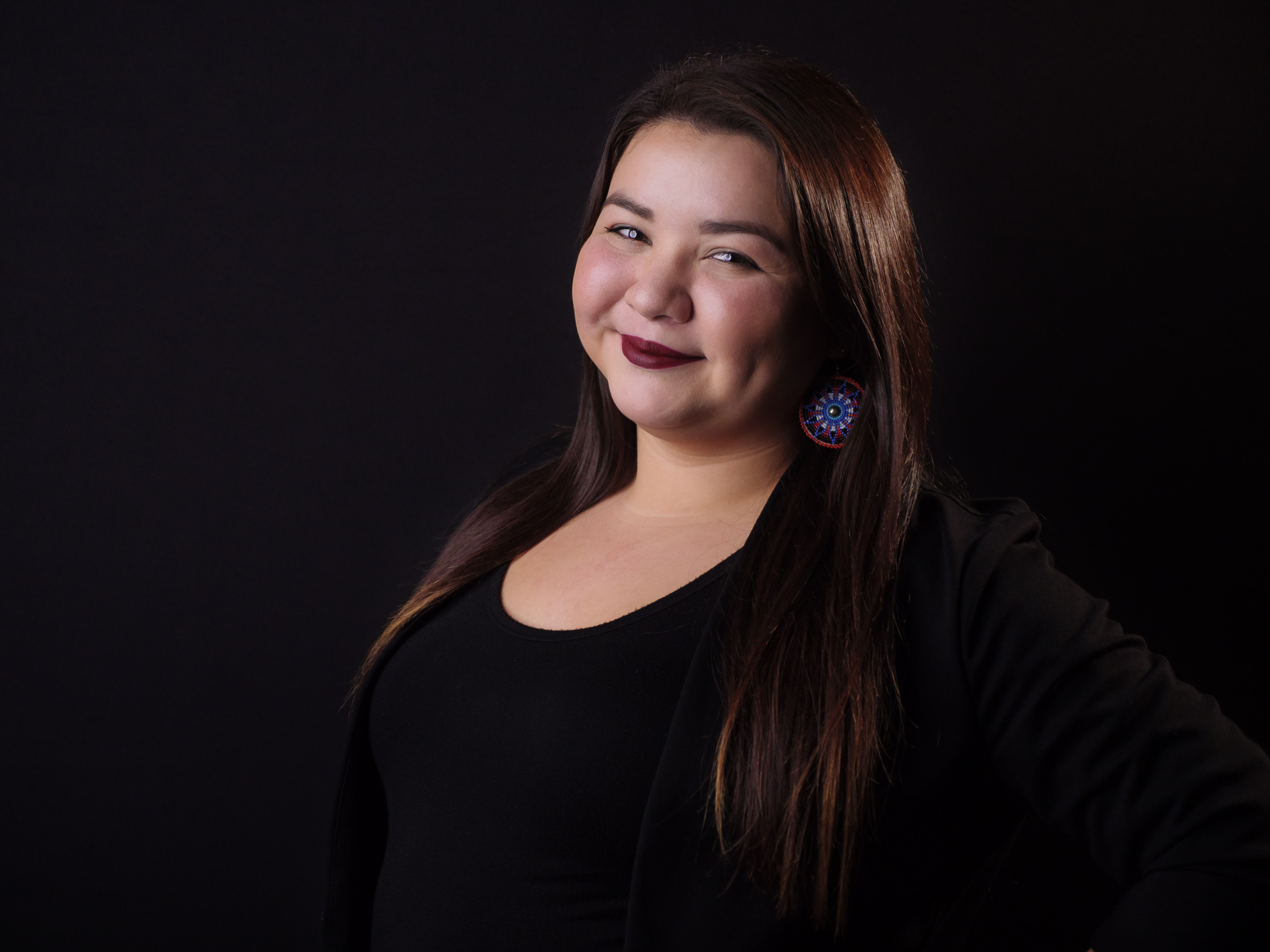 Boozhoo (Greetings), my name is Biidaaban Moses Reinhardt. I am an Anishinaabe Ojibwe
woman, a citizen of the Sault Ste. Marie Tribe of Chippewa Indians, and am from the
Upper Peninsula of Michigan. I received my Bachelors degrees in Native American Studies
and Physics from Northern Michigan University, and graduated from SUNY ESF with a
Masters degree in Sustainable Construction in August 2020. My thesis research focused
on traditional ecological knowledge and experimental design in contemporary building
materials in the Great Lakes Region. After graduation, I was a Climate Justice Rural
Fellow for MEJC Action in which I completed a media project highlighting environmental
justice concerns for Michigan tribes. Currently, I work full-time as the Environmental
Justice Organizer with We The People Michigan, where I am fighting for clean water
and energy justice. Lastly, I am a freelance graphic designer with Williamson Creative
Agency where I have led the creative concepts and graphic design for various organizations,
events, and conferences such as the Native American Critical Issues Conference for
five years with the Michigan Indian Education Council.
Boozhoo (Greetings), my name is Biidaaban Moses Reinhardt. I am an Anishinaabe Ojibwe
woman, a citizen of the Sault Ste. Marie Tribe of Chippewa Indians, and am from the
Upper Peninsula of Michigan. I received my Bachelors degrees in Native American Studies
and Physics from Northern Michigan University, and graduated from SUNY ESF with a
Masters degree in Sustainable Construction in August 2020. My thesis research focused
on traditional ecological knowledge and experimental design in contemporary building
materials in the Great Lakes Region. After graduation, I was a Climate Justice Rural
Fellow for MEJC Action in which I completed a media project highlighting environmental
justice concerns for Michigan tribes. Currently, I work full-time as the Environmental
Justice Organizer with We The People Michigan, where I am fighting for clean water
and energy justice. Lastly, I am a freelance graphic designer with Williamson Creative
Agency where I have led the creative concepts and graphic design for various organizations,
events, and conferences such as the Native American Critical Issues Conference for
five years with the Michigan Indian Education Council.
Mariah Gladstone
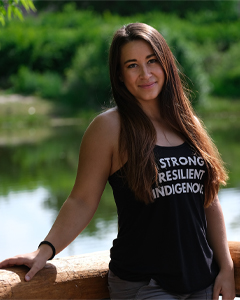 Oki, my name Mariah Gladstone. I am Amskaapi Pikuni, Kainai, and Tsalagi and was raised
in Northwest Montana. I graduated from Columbia University with a degree in Environmental
Engineering and returned home where I started an online cooking show called Indigikitchen.
I am passionate about sustainability and completed a service term through Energy Corps
where I helped write a Climate Action Plan for the City of Whitefish. My work has
been recognized me as a "Champion for Change" through the Center for Native American
Youth, a "Culture of Health Leader" through the Robert Wood Johnson Foundation, and
a Grist 50 "Fixer." I am currently on the board of the Native Youth Food Sovereignty
Alliance (NYFSA). I am pursuing my M.S. in Environmental Science with a concentration
in Coupled Natural and Human Systems.
Oki, my name Mariah Gladstone. I am Amskaapi Pikuni, Kainai, and Tsalagi and was raised
in Northwest Montana. I graduated from Columbia University with a degree in Environmental
Engineering and returned home where I started an online cooking show called Indigikitchen.
I am passionate about sustainability and completed a service term through Energy Corps
where I helped write a Climate Action Plan for the City of Whitefish. My work has
been recognized me as a "Champion for Change" through the Center for Native American
Youth, a "Culture of Health Leader" through the Robert Wood Johnson Foundation, and
a Grist 50 "Fixer." I am currently on the board of the Native Youth Food Sovereignty
Alliance (NYFSA). I am pursuing my M.S. in Environmental Science with a concentration
in Coupled Natural and Human Systems.

